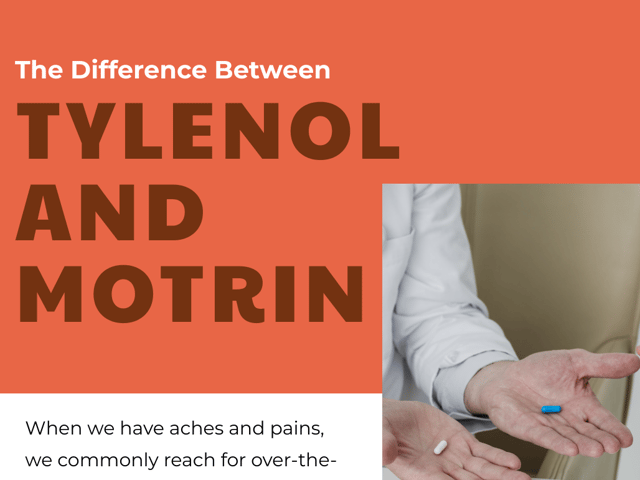
The Differences between Tylenol™ and Motrin™
When we have aches and pains, we commonly reach for over-the-counter medications like Tylenol™ or Motrin™. Many people think they are interchangeable. But what are the differences and when might one be better than the other?
What are Prostaglandins?
To understand the difference, we need to understand prostaglandins. Prostaglandins are produced by the body in response to illness or injury, and they have different impacts on the nervous system and outlying tissues. In the nervous system, they are responsible for transmitting pain signals and inducing fever. In outlying tissues, prostaglandins promote inflammation, contribute to coagulation, and protect the stomach lining.
Tylenol™
Tylenol™ is a brand-name for Acetaminophen, and it is classified as both a pain reliever (analgesic) and fever reducer (antipyretic). While its mechanism of action is not fully understood, it is believed that Acetaminophen reduces the production of prostaglandins in the nervous system but not outlying tissues. Because Acetaminophen mainly works in the nervous system, it is effective in blocking the transmission of pain, treating mild to moderate aches, and reducing fever but not effective in reducing inflammation.
Motrin™
On the other hand, Motrin™ is the brand-name for Ibuprofen, which is classified as a nonsteroidal anti-inflammatory drug (NSAID). Ibuprofen blocks the enzyme cyclooxygenase (COX), which is needed to produce prostaglandins. Because prostaglandins are reduced throughout the body, Ibuprofen can be used for pain and fevers and has the ability to reduce inflammation. This is why Ibuprofen is a better medication for arthritis and muscle aches.
Considerations for Tylenol™ and Motrin™
In comparing side effects, both may cause a rash or nausea. Acetaminophen should not be used in people with liver damage or a history of heavy alcohol abuse. But Acetaminophen is safe to use in febrile children or during pregnancy. Ibuprofen, however, should be used with care as it may cause bleeding and/or stomach ulcers. For this reason, Ibuprofen should be avoided before and after surgery.

Keep Reading

National Council Licensure Examination-Practical Nurse Blog
How Long Should I Study for the NCLEX-PN?
For aspiring nurses, the NCLEX-PN is a critical hurdle on the path to b…

National Council Licensure Examination-Practical Nurse Blog
How to Become an LPN
Would you like to average $30 dollars per hour in a rewarding full-time…

National Council Licensure Examination-Practical Nurse Blog
What Is the Difference between Dementia and Alzheimer’s?
Many people use the terms dementia and Alzheimer’s interchangeably, but…